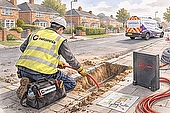Home > Broadband > News > Will Ofcom's plan for faster, cheaper rural broadband work?
Will Ofcom's plan for faster, cheaper rural broadband work?
OFCOM announced plans this week designed to make broadband in rural areas faster and cheaper.

The plan is simple: make BT Openreach reduce the amount broadband providers have to pay to use the most rural exchanges.
Ofcom hope that reducing that initial price will bring more providers into an area, increasing competition and reducing prices.
They also hope that it will increase speeds since, with less expenses upfront, broadband providers will be able to buy up more capacity.
Ofcom also notes that it hasn't reduced costs for providing 24Mb ADSL2+ or BT's fibre, which could encourage BT to unbundle those exchanges to provide those services.
Up to 3m homes and businesses are set to benefit from the reduction, according to Ofcom.
In particular, those who fared least well in Ofcom's broadband speed map, hard-to-access parts of Scotland, Wales, Northern Ireland, the South West, Yorkshire, Northumberland and Cumbria should be in line for better broadband.
Will it work?
The plan sounds simple but will it work?
Echoes of LLU unbundling?
Cutting costs in exchanges has echoes of Ofcom's previous decision to open up or unbundle some exchanges to increase competition.
That has indeed resulted in much cheaper, faster broadband in most areas, with a few hiccups, and this could finish the job.
Or could it?
The comparison with LLU or unbundled exchanges is a little spurious: rural broadband users will still be stuck with wholesale resold deals like O2's 'Access' and there's no guarantee that they'll be cheaper.
Diminishing returns
Richard Brown, chief operating officer at Whispa Ltd, which provides broadband access in rural Wales is also less than enthusiastic.
"Ofcom are either clueless, witless or toothless - it's difficult to make my mind up which it is," he's said.
"A reduction in the wholesale pricing gives BT less reason to invest in rural communities due to diminishing return on investment. And a reduction in wholesale costs of 10% isn't a reduction in costs to resellers and agents - wholesale bandwidth makes up a very small proportion of the cost to deliver rural broadband."
BT itself refused to be drawn on the possible impact on consumers.
"Unlike many other providers, despite the higher costs involved, BT Retail's consumer broadband products have always been priced the same in rural areas as in urban areas," it said.
"This ruling is therefore of more relevance to those ISPs who currently charge a supplement in rural areas."
Disappearing returns
Finally, as we've seen in the past, a reduction in wholesale prices isn't necessarily passed on to consumers.
For example, Ofcom got its sums wrong on BT Openreach's prices in May 2009 and accidentally charged LLU providers £86.40 rather than £85.04 for a fully unbundled facility.
The mistake was picked up on by the Competition Appeal Committee after a case was bought by TalkTalk and Sky and was expected to lead to cheaper broadband for consumers.
However, the pricing error actually amounted to a 3.7% increase or £1.36 per line per year, not a great deal in individual terms at around 11p per month.
Indeed the real winner here, despite it actually being in the wrong, was BT.
The ruling wasn't applied retrospectively so BT kept all the extra cash it made: if we estimate there are 7 million LLU lines in the UK market that's around £9.5 million. Nice.
Receive consumer updates that matter in our newsletter

We are independent of all of the products and services we compare.

We order our comparison tables by price or feature and never by referral revenue.

We donate at least 5% of our profits to charity, and we aim to be climate positive.
Latest News

23 February 2026
Sky Atlantic to launch on Virgin TV in April
20 February 2026
Virgin Media complaints hit six-year low
18 February 2026
Virgin Media O2 owners to buy Netomnia parent in £2bn dealReceive consumer updates that matter in our newsletter


